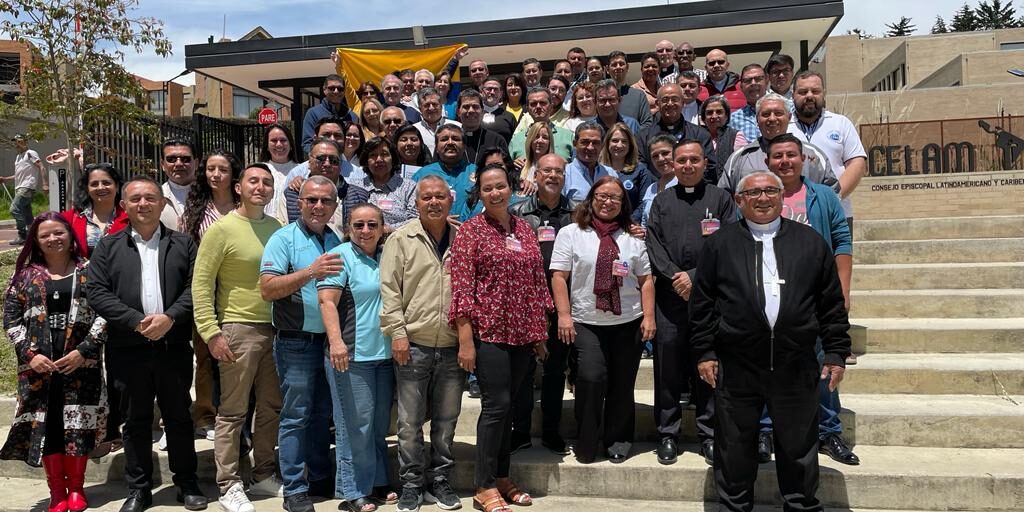The Latin American and Caribbean Episcopal Council, known by the Spanish acronym CELAM (Consejo Episcopal Latinoamericano y Caribeno), hosted a meeting of clergy and laity involved in family life.
The first-ever meeting of Latin America and Caribbean Episcopal Commissions for Family Ministry was held at CELAM’s headquarters in Bogota, Colombia October 2 to 6.
The group of 50 people made up of 7 bishops, 11 priests, 15 couples and two lay women analysed the progress made on the continent regarding the implementation of Pope Francis’ post-synodal apostolic exhortation Amoris Laetitia, the catechumenal itineraries for married life and the Global Family Pact.
Countries represented included hosts Colombia, Honduras, Uruguay, Guatemala, Chile, Panama, Argentina, Mexico, Venezuela, Bolivia, Ecuador, Brazil, Puerto Rico, Peru, Costa Rica, Dominican Republic, and El Salvador. Nicaragua did not attend as the leaders said they would find it difficult to return if they left their country. Also missing were Paraguay, and Cuba.
The English-, Dutch- and French-speaking Caribbean dioceses, known collectively as the Antilles, were represented by Bishop Robert Llanos of St John’s-Basseterre, Chair of the Commission on Laity and Family Life in the Antilles Episcopal Conference (AEC) of bishops, and Commission members Tricia and Raymond Syms.
The agenda began with the October 2 Eucharistic celebration presided over by Bishop Alfonso Gerardo Miranda Guardiola. In his homily, the Auxiliary Bishop of Monterrey, Mexico recalled the importance of family pastoral care and its mission in accompanying other families who face adverse realities daily that require being equipped with various pastoral and spiritual tools the Church can provide.
The AEC contingent, the only English-speaking participants, was warmly welcomed by their Colombian hosts at the opening Mass. They promised to be their guardian angels during the week. October 2 was the Church’s Feast Day of the Holy Guardian Angels.
After the presentation of the delegations on October 3, the message from Bishop Lizardo Estrada, General Secretary of CELAM, highlighted the permanent support they provide to the families of the continent, inviting them to share experiences and efforts without losing the ability to dream.
“I invite you to share this service in relation to the construction of family processes. Maintain your interest in the appropriation of the text of the Ecclesial Assembly and the contribution that the family can make to the synodal path that the universal Church lives,” the Auxiliary Bishop of Cusco, Peru said in his pre-recorded video message, “without losing sight of the fact that the family is an active pastoral subject, present in the Instrumentum Laboris of the Synod of Synodality.”
The first two days of the meeting were dedicated to listening to reports of the Episcopal Commissions on their experiences, activities, successes and challenges. Among the challenges mentioned by presenters were abortion, euthanasia, gender ideology, governmental interference, economic, cultural and terrain.
Fr Fabio Antunes, director of Cebitepal (Pastoral Theological Biblical Center for Latin America and the Caribbean), lead organiser of the event, explained that CELAM seeks to allow the various conferences to learn about the experiences and processes carried out in other countries from the meeting.
“By accompanying this path, we have discovered various initiatives that range from premarital accompaniment, attention to special cases and other innovative initiatives that, when shared, can grow on the continent,” he stated, especially on issues such as the Pope’s invitation to live the Global Pact for Families.
He added that there are the changes to family life that, despite being within the teachings of the Church, are not yet worked on in the Episcopal Conferences, which many times focus on the traditional family.
The new family models are a challenge for the Church; they include widows, divorcees, couples with children of sexual diversity, “and many other realities that touch their lives and require accompaniment”.
On day 3, sections of Amoris Laetitia were discussed, led by Fr Ronny Humberto Solano Fallas (Costa Rica), and later, there was a visit to the Minor Basilica of Our Lady of Lourdes for conversations with people involved in the various family life ministries of the Archdiocese of Bogota.
A message to Pope Francis, and to families of the continent was on the final day’s agenda.
— Raymond Syms, Editor, adapted from an







